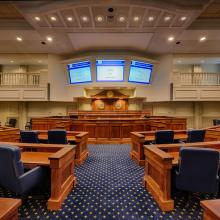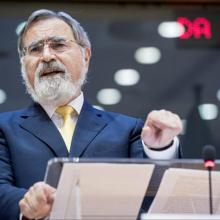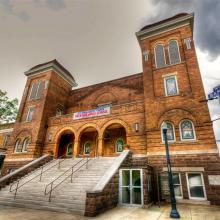Birmingham
Randall Marshall, the legal director of the ACLU of Alabama, expressed the ACLU of Alabama’s opposition to both Briarwood’s request and a bill that would give churches in Alabama permission to hire armed congregants and protect them legally if they shoot anyone.
“It’s our view this would be plainly unconstitutional,” said Randall Marshall.
Rabbi Jonathan Sacks made a name for himself as chief rabbi of Great Britain for nearly a quarter-century, a time of great tumult that included the Sept. 11, 2001, attacks, the influx of millions of Muslims into Europe, and the ongoing pressures to absorb and assimilate newcomers into a mostly secular society.
As chief rabbi, from 1991 to 2013, he stressed an appreciation and respect of all faiths, with an emphasis on interfaith work that brings people together, while allowing each faith its own particularity.
In one of his last official acts, President Obama has designated Sixteenth Street Baptist Church, and other civil rights landmarks in Birmingham, Ala., as the Birmingham Civil Rights National Monument.
The designation protects the historic A.G. Gaston Motel in that city, where the Rev. Martin Luther King Jr. and other civil rights leaders had their 1963 campaign headquarters, as well as Kelly Ingram Park, where police turned hoses and dogs on civil rights protesters. And it includes the Sixteenth Street Baptist Church, where four girls died in 1963, after the Ku Klux Klan detonated 19 sticks of dynamite outside the church basement.

Image via Thomas J. O'Halloran/Wikimedia Commons.
My prayer for the next 50 years is that the church can find the Gospel and put it first — ahead of race, class, nationalism, gun rights, and any other worldly divisions that place God's people in danger; and to recognize that apathy toward any of God’s people is a sin. As Christians, we owe it to the four Birmingham girls and the Charleston Nine to band together, to fight against allowing another hate crime within the walls of a holy space again.
AS AN EVANGELICAL pastor of a multiethnic church in New York City, I often find myself at the intersection of lively discussions about race. These conversations almost inevitably lead to a familiar question: What does the church do now? Maybe stated another way, “How do we work toward the dream of the beloved community?” This is why I find Edward Gilbreath’s Birmingham Revolution: Martin Luther King Jr.’s Epic Challenge to the Church to be a timely and necessary read.
While many books have been written on Dr. King and civil rights, Birmingham Revolution places King’s faith at the foreground of the writing. This is an important distinctive as King has often been co-opted, by conservative and liberal agendas alike. Yet history cannot deny that prayerful action, and a gospel that took seriously the social dimensions of human life, were at the very heart of King’s theology.
Birmingham Revolution hones in on the year 1963—a time when the Southern Christian Leadership Conference took the civil rights efforts into the bowels of structural racism. Brown vs. Board of Education had provided an important Supreme Court victory in 1954, but many forms of local resistance to desegregation prevailed in the South.
To compound the drama, many advocates in Alabama, both black and white, believed further progress should happen through legal means. They had a misplaced confidence that local structures would uphold federal law, despite the continued presence of the KKK and other such groups. Gilbreath explains Birmingham’s defining moment not only in confronting segregation, but also in challenging the subtler, unwittingly complicit voice of the moderate.
BERNICE KING watched as, one by one, the heads of denominations from across the nation bent down to sign the Christian Churches Together in the U.S.A. “Response to Dr. Martin Luther King Jr.’s ‘Letter from Birmingham Jail.’” Transfixed, King—Martin King’s daughter—sat in the first row of a church one block from Kelly Ingram Park, where 50 years before children had run scared, ravaged by German shepherds and fire hoses.
As they signed, the presidents of CCT’s five church “families” stepped to the podium. Each read his or her church family’s confession of complicity with the demons of racism and injustice during and since the civil rights era.
Fifty years ago, Martin Luther King Jr. sat behind bars in the Birmingham city jail and responded to criticism from eight local white clergy’s “Call for Unity” against outside agitators. King penned prophetic words in the margins of the newspaper that carried the white clergy’s call for “law and order and common sense.”
“Injustice anywhere is a threat to justice everywhere,” King explained. He recounted the failed attempts to negotiate with city officials hell-bent on living a “monologue rather than dialogue.” He clarified: “The purpose of our direct-action program is to create a situation so crisis-packed that it will inevitably open the door to negotiation.”
BIRMINGHAM, Ala. — In May 1963, thousands of Birmingham school children faced police dogs, fire hoses, and possible arrest to demonstrate against segregation. Now, 50 years later, those who were part of what became known as the “Children’s March” say they don’t want their story to be forgotten.
“We were doing this not just for ourselves but for some higher purpose,” said one of the young marchers, Freeman Hrabowski III. “It focused on civil rights for all Americans.”
Hrabowski is now president of the University of Maryland, Baltimore County. He was 12 when he marched in Birmingham and was arrested for parading without a permit. He and hundreds of other children were held in custody for five days before being released.
Experts say the children’s crusade helped galvanize the civil rights struggle at a time when efforts were flagging.
“That was really the tipping point in a tipping year,” Pulitzer Prize-winning author Taylor Branch, who has written a series of books about the civil rights movement, told the PBS program “Religion & Ethics NewsWeekly.”
Watch Birmingham and the Children’s March on PBS. See more from Religion & Ethics NewsWeekly.
A half a century after Dr. Martin Luther King Jr. penned “Letter from Birmingham Jail,” King’s prophetic words continue to reverberate. In “To Redeem the Soul of America” (April 2013), author and historian Vincent G. Harding recounts his time with King and explains how King’s “living letter” impacts each of us today.
Watch this video to learn more about King’s historic letter.
In January 2011, members of Christian Churches Together in the U.S.A. met in Birmingham, Ala., to examine issues of domestic poverty and racism through the lens of the civil rights movement and by reading together Martin Luther King Jr.'s "Letter from Birmingham Jail." As they gathered in the 16th Street Baptist Church under the beautiful Wales Window portraying the black Christ, which replaced the window blown out when the church was bombed in 1963, these contemporary church leaders, representing the broadest Christian fellowship in the country—36 national communions and seven national organizations, including Sojourners—realized that apparently no clergy had ever issued a response to King's famous letter, even though it was specifically addressed to "fellow clergymen [sic]." In 2013, to mark the 50th anniversary of King's letter, Christian Churches Together released its thoughtful response, which we excerpt below. —The Editors
WE CONFESS. As leaders of churches claimed by more than 100 million Americans; as Catholics, evangelicals, Pentecostals, Orthodox, Historic Protestants, and members of Historic Black denominations; as people of many races and cultures: We call ourselves, our institutions, and our members to repentance. We make this confession before God and offer it to all who have endured racism and injustice both within the church and in society.
As church leaders, we confess we have tended to emphasize our responsibility to obey the law while neglecting our equal moral obligation to change laws that are unjust in their substance or application. All too often, the political involvement of Christians has been guided by the pursuit of personal or group advantage rather than a biblically grounded moral compass. We confess it is too easy for those of us who are privileged to counsel others simply to "wait"—or to pass judgment that they deserve no better than what they already have.
We confess that we are slow to listen and give legitimacy to those whose experience of race relations and social privilege in America is different than our own. We keep the "other" at arm's length to avoid hearing the call to sacrifice on their behalf. Our reluctance to embrace our "inescapable network of mutuality" underscores Dr. King's observation that privileged groups seldom give up their advantages voluntarily. For example, it is difficult to persuade most suburban Christians to demand that they strive for the same quality of education in our cities that they take for granted in their own schools. To the extent that we do not listen in love, our influence in society is limited to "a weak, ineffectual voice with an uncertain sound."
AT TIMES IT SEEMS VERY HARD to realize that half a century has passed since my late wife, Rosemarie, and I were in Birmingham, Ala., living out a part of our years of service as representatives of the Mennonite churches of America to the Southern freedom movement—that historic black-led struggle for the expansion of democracy in America (inadequately labeled "the civil rights movement").
It was in the midst of those powerful days, in the late winter and early springtime of 1963, when our extraordinary people's movement was spreading to dozens of communities across the South, with some important reverberations in the North, and across the world as well. Usually initiated by courageous home-grown black leaders such as Rev. Fred Shuttlesworth of Birmingham and Victoria Gray of Palmers Crossing, Miss., the determined local groups often called upon national or South-wide organizations to help them in their campaigns.
Late in 1961, Shuttlesworth, who was part of the King-led Southern Christian Leadership Conference (SCLC), asked Martin Luther King Jr. and SCLC to come help the Birmingham movement. It faced a level of continuing white terrorism that led the black community to call their city "Bombingham," referring, of course, to the deadly violence they encountered whenever they attempted to challenge the white segregationist powers who were determined to keep black people in a submissive, separate, and dominated role.
When King and SCLC decided to respond to Shuttlesworth and move onto the Birmingham scene, Rosemarie and I were already friends and co-workers with Martin and Coretta, and King asked us to come participate in the struggle for the transformation of Birmingham. So we were present and in the line of marchers when King, his co-worker Ralph Abernathy, and others were arrested in early April 1963.
This past weekend, The Faith and Politics Institute led a three-day Congressional trip to visit Civil Rights landmarks across Alabama — from Tuscaloosa to Birmingham to Montgomery to Selma. It was an incredibly moving, emotionally exhausting, soul-quenching pilgrimage as we journeyed along with heroes of the Civil Rights movement and experienced their stories.
One such hero is Congressman John Lewis. A highlight of the trip for me is recorded at the jump.
On Monday's Colbert Report, Sojourners friend and Civil Rights activist Scott Douglas, discussed the overturn of Alabama's immigration law with host (and possible presidentail candidate) Stephen Colbert, and calls for a single, fair and national immigration law for the entire country.
Douglas is executive director of the Greater Birmingham Ministries in Alabama.
Watch his conversation with Colbert inside the blog...





